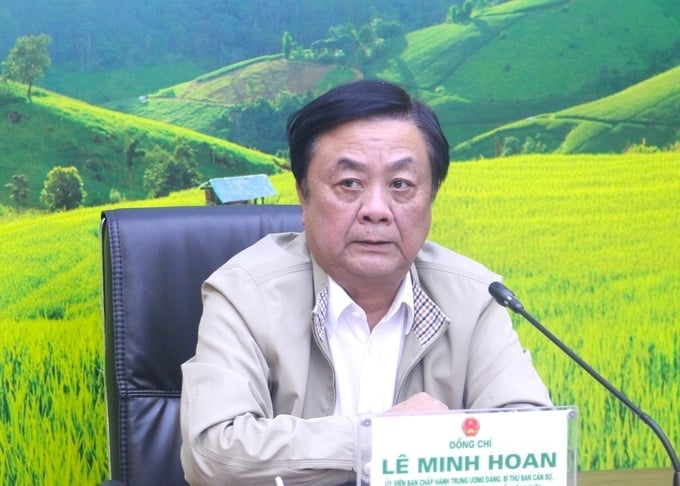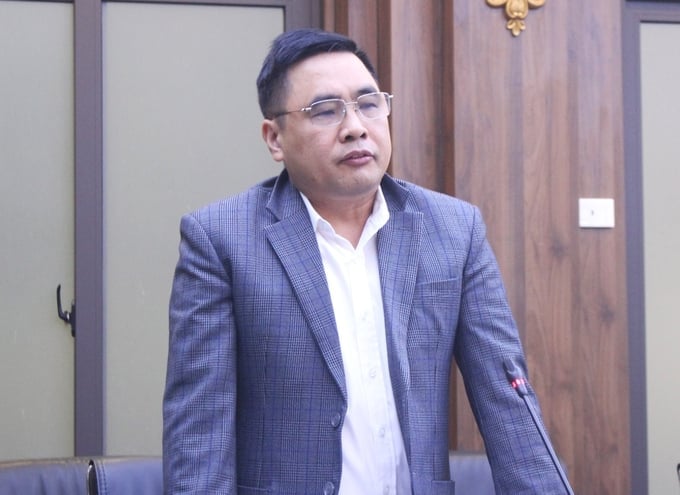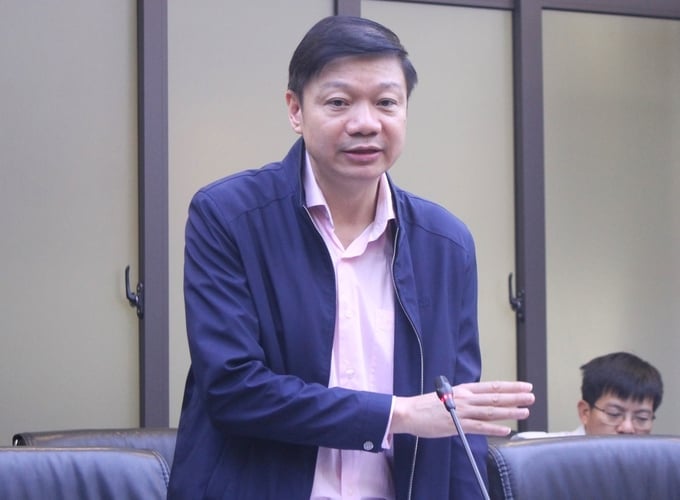May 21, 2025 | 07:23 GMT +7
May 21, 2025 | 07:23 GMT +7
Hotline: 0913.378.918
May 21, 2025 | 07:23 GMT +7
Hotline: 0913.378.918

Minister of Agriculture and Rural Development Le Minh Hoan, emphasized that the key objective in the development of multi-value forest ecosystems is to ensure forest protection and bring numerous benefits to the local communities closely associated with the forest. Photo: Trung Quan.
Mr. Tran Quang Bao, Director of the Department of Forestry, stated that the value of Vietnam's forest ecosystem is manifested in various aspects, such as raw materials, non-timber forest products, tourism, forest environmental services, carbon sequestration and preservation.
The project for the development of multi-value forest ecosystems by 2030, with a vision towards 2050, is designed to enhance the effectiveness of forest resource management and sustainable use. The project aims to generate employment, increase income, stabilize and improve the lives of ethnic minorities in mountainous areas, forest workers, and local residents. Consequently, this project contributes to a multitude of aspects, including socioeconomic development, natural resource conservation; biodiversity, environmental protection; climate change adaptation; preservation and promotion of cultural, historical, scenic, and indigenous knowledge values of local communities; enhancement of national security and defense.
Accordingly, the project's goals include sustainable development of the wood supply, meeting a minimum of 80% of demand by 2030 and 100% by 2050. Additionally, the project aims to utilize only legally-sourced wood and wood products. The value of non-timber forest products and medicinal herbs is targeted to increase by 1.5 times compared to 2020 by 2030 and double by 2050. The export turnover is expected to account for 10 to 15% of total forestry export turnover by 2030 and 25% by 2050.
Additionally, efficient combinations of agricultural and forestry production models will be further developed, contributing to an economic value increase per unit area of at least 20%, excluding the value of planted forest wood, by 2030. Forest environmental services are planned for a stable growth rate of 5% per year to ensure a steady source of income.

Deputy Minister of Agriculture and Rural Development Nguyen Quoc Tri suggested local governments to explore the option of establishing a model for exploiting multi-value forest ecosystems. Photo: Trung Quan.
The stability and development of specialized forest areas until 2030 is targeted to increase by 10 to 15% compared to 2020. Establishing action plans for the protection of endangered and rare forest animal species in Vietnam is another focus of the project. Community-based tourism, eco-tourism, resorts, and sustainable entertainment activities will be developed to increase revenue by 50% by 2030 and 100% by 2050.
Furthermore, approximately 50% of ethnic minority labor is expected to divert to the forestry sector by 2030. The proportion of trained, educated, and guided labor is expected to reach at least 40% by 2030 and 70% by 2050. Efforts will be made to increase the average income of ethnic minority labor by 1.5 times by 2030 and double by 2050 compared to the income level in 2025.
Deputy Minister of Agriculture and Rural Development Nguyen Quoc Tri believes that the project represents a new development step for the forestry sector. However, despite regulations for many aspects of forest value exploitation, there are still limitations in place. As a result, local governments can explore the possibility of constructing a model to serve as a practical basis, thereby providing feedback and suggesting adjustments to legal regulations according to practical demands.
Minister of Agriculture and Rural Development Le Minh Hoan, emphasized that the key objective in the development of multi-value forest ecosystems is to ensure forest protection and bring numerous benefits to the local communities closely associated with the forest. As a result, the project needs to prioritize the well-being of local communities neighboring forests as well as the forest management and protection forces by providing them with additional motivation and long-term commitment to the forests.
On the other hand, the project also aims to encourage the development of tourism activities under the forest canopy to local governments. This involves attracting investments from businesses as well as creating policies to gather and organize community-based tourism development for local communities neighboring forests. Accordingly, the project will support various activities which do not impact or alter the forest's current state, such as forest sightseeing, experiential activities, and activities outside the forest. Additionally, forest management agencies need to explore the establishment of tourist centers under their management, promote public-private partnerships for the sustainable development of forest tourism.

Mr. Tran Quang Bao, Director of the Department of Forestry, sharing insights on the project for the development of multi-value forest ecosystems until 2030, with a vision towards 2050. Photo: Trung Quan.
Regarding the development of medicinal herbs under the forest canopy, the current state of local production, especially within ethnic communities in mountainous areas, can only address hunger and poverty issues. Consequently, the project needs to establish a roadmap and long-term solutions, with a focus on creating a sustainable medicinal herb industry. Accordingly, research institutes must focus on preserving and developing high-quality seed varieties and implementing advanced production processes. Collaboration between relevant ministries, departments, and local authorities is crucial to promptly address any regulatory obstacles and create favorable conditions for the stable development of this activity by the local communities.
Translated by Nguyen Hai Long

(VAN) In 2024, over 295 million people across 53 countries and territories faced acute hunger—an increase of almost 14 million people compared to 2023, while the number of people facing catastrophic levels of hunger reached a record high.

(VAN) World Environment Day 2025 (June 5) carries the theme 'Beat Plastic Pollution' continuing to emphasize the global urgency of addressing the plastic waste crisis.

(VAN) This was the assessment shared by experts at the workshop titled 'Assessing the Role and Potential of Low-Emission Rice Production Systems in Vietnam,' held on the morning of May 19.

(VAN) Cai Rong Port is the fisheries control center of Quang Ninh, helping to monitor fishing vessels, combat IUU fishing, and remove the EC's 'yellow card'.

(VAN) The German Agricultural Society (DLG) explores the possibility of establishing a mechanization service center in Vietnam’s Mekong Delta to support farmers in accessing and utilizing advanced machinery.

(VAN) On May 16, the Department of Water Resources Management, in collaboration with the Food and Agriculture Organization of the United Nations (FAO), held a signing ceremony for the GEF-8 project document.

(VAN) Food safety, mechanization, vocational training, and market opening are key areas of cooperation expected between the Vietnamese Government and the Federal Republic of Germany.